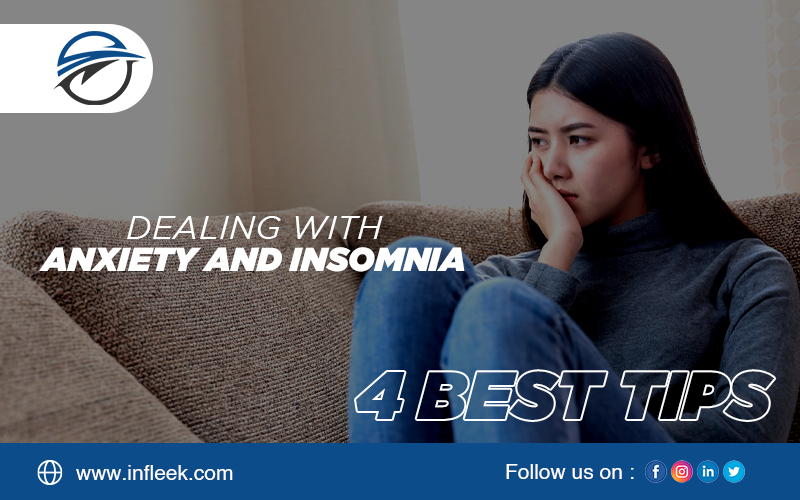The progress of anxiety and insomnia is moderately common in today’s world due to the accumulation of stress levels in every aspect of life. The high levels of pressure have given birth to an assortment of problems commonly falling under the umbrella of anxiety-related disorders. For this justification, we have formulated this short yet informative guide to assist you to navigate through your anxiety problems and understand how you can resolve your insomnia.
Connection Between Anxiety and Insomnia
Insomnia is the medical phrase indicated for a variety of complications associated with sleep deprivation. Whereas, anxiety can be deemed as the body’s way of depicting stress; signs of insomnia encompass complications in falling asleep, regular break-ups in your sleep cycle, and waking up feeling fatigued and unrested.
The concern of the relationship between anxiety and insomnia can be resolved by inferring which of the two came foremost. Due to sleep deprivation or the opposite, unreasonable sleeping, the body inclines to formulate different types of anxiety disorders that can be distressing, hampering one’s everyday life.
Also, anxiety can have an alarming impact on your sleep cycle and disrupt your sleeping manner. Therefore, anxiety can also be deemed a trigger of insomnia.
So, there is no clear evidence as to which of the two is accountable for the occurrence of the other. Still, one thing is obvious that the presence of either of the two ensures that the other problems become disruptive.
How to Handle Anxiety and Insomnia
- Introduce Exercise
Exercise can maintain your mind busy and active in self-development workouts. Anxiety often arises because our minds alleviate and think about problematic thoughts over and over again, like being on a cognitive treadmill. Still, with a beneficial exercise habit, your body stays active throughout the day maintaining your mind away from the concerns of the world. When you eventually get to your bed, you will experience tiredness which will enable you to fall asleep and find therapy for your tiredness.
- Induct the Use of Cannabis
Inducting the usage of cannabis in your lifestyle might not seem like a nice idea at first deeming the taboo around it. Still, the usage of particular products generated from cannabis plants can come in handy for anxiety-related problems. For this reason, the experts at CFAH speculate that the users of cannabidiol (CBD) oil should experience substantial changes in their health. Similarly, since CBD oil can be consumed in several ways, it is always recommended, by reputable medical health specialists, as one of the ways to deal with anxiety and insomnia problems.
- Maintain Your Bedroom Dark and Quiet
Maintain a dark and peaceful vibe in your bedroom to avert distracting yourself. The usage of electronic appliances which radiate a deadly blue light should be averted to assure you don’t disrupt your sleep cycle. Music has the inherent quality of bringing up peace in the mind of the listener. This is why people who undergo complications in sleeping are always urged to listen to calming and soothing music before going to bed, to assure their mind is diverted from stress and any sorrows so they can feel peaceful in the warmth of their bed.
Analyze Your Anti-Anxiety Medications
Anti-anxiety medications are contemplated as an incredibly common solution for patients undergoing anxiety. Nevertheless, you are required to review your medications for probable side effects and try to drive away from them. Similarly, if you’re a smoker, you should make efforts to quit smoking as this addiction is a crucial trigger for sleep deprivation.
Common Anxiety-Driven Disorders
- Generalized Anxiety Disorder (GAD)
If you feel nervous about normal day-to-day circumstances, you have possibly evolved into a generalized anxiety disorder. The signs of GAD are found in people who do not need any particular reasons to feel worried and can be found stressed in easy situations.
- Obsessive-Compulsive Disorder (OCD)
The evolution of obsessive and interfering thoughts is a noticeable sign of the presence of OCD. People undergoing OCD need perfection in their routine tasks and feel disturbed if their surroundings don’t fulfill their subjective requirements.
- Panic Attacks
People who tend to get anxious and worried about tiny and modest issues, tend to have recurring outbreaks of panic attacks.
- Post-Traumatic Stress Disorder (PTSD)
Post-Traumatic Stress Disorder (PTSD) is found in people who have undergone a traumatic loss in any part of their life. The timing of the incident does not affect the growth of this type of disorder and people who undergo it require affectionate assistance to spiral out of their problems.
Handling stress-related problems can never be simple, irrespective of your level of stability. On top of that, if it is associated with insomnia, the outcomes can be horrifying and it can get hard for people to find solutions. For this justification, the identification of anxiety-triggering explanations is necessary to make certain you can fight and recoup properly from them. Also, since insomnia can have a nerve-wracking effect on your overall health, you require to specify its reasons and implement treatments to overhaul this problem too. This will enable you to preserve your health and bring up peace into your lifestyle.

